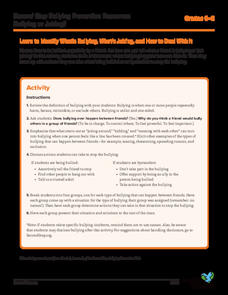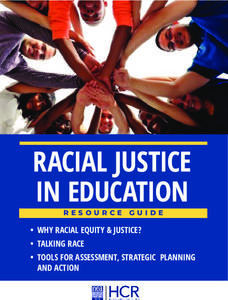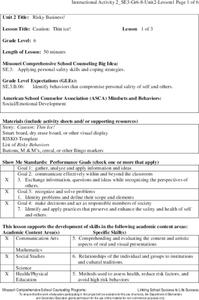Just Health Action
How are Equality and Equity Different?
Equality does not equal equity. That's the take-away from a instructional activity that asks young people to consider what could be done to make a variety of situations more just, more equitable. After examining images that illustrate...
Just Health Action
Environmental Justice Matters: Mapping Environmental Justice Impacts (Part 1)
A case study of Seattle, Washington permits class members to compare and rank how different areas of Seattle are impacted by environment burdens. Groups investigate different zip codes, collect data on five categories, and color-code a...
Just Health Action
Environmental Justice Matters: Mapping Cumulative Impacts (Part 2)
A case study enables class members to confirm whether different geographic parts of Seattle, Washington have disproportionate environmental burdens and benefits. Groups use the EPA's Cumulative Health Impact Analysis formula and...
Just Health Action
Causes of the Causes: What Are the Root Causes of This Problem?
A "Causes of the Causes" diagram enables class members to examine the contributing factors to a problem. After reading a poem that models the process, class members, either in gorps or individually, diagram an issues they are passionate...
Just Health Action
Whose Backyard? Toxic Waste Management Meeting and Environmental Injustice
Toxic waste is a global problem. What to do with environmental hazards and where to put toxic waste is a global concern. To better understand current issues around toxic waste management and how current practices can lead to...
Just Health Action
What Makes a Community Healthy?
Young people have an opportunity to make it a beautiful day in their neighborhoods with an activity that asks them to identify what is healthy and unhealthy in their community and develop some ideas about what they can do to fix the...
Committee for Children
Learn to Identify What’s Bullying, What’s Joking, and How to Deal With It
A quick lesson takes a look at the differences between bullying and joking. Through whole-class discussion, scholars identify between the two behaviors and brainstorm actions to take to cease bullying behavior. Small groups share with...
National Education Association
Racial Justice in Education Resource Guide
Strive for racial justice within your classroom community with help from an 80-page resource guide. Five modules move scholars through thoughtful, and reflective grand conversations to making a plan, then taking action. Learners write...
Facing History and Ourselves
Unit Assessment: From Identity to Action
Four projects enable class members to show what they have learned about ways they can stand up for democracy. to begin, individuals review their identity charts and craft a mask that represents themselves. Next, groups create a short,...
Facing History and Ourselves
Speaking Up and Speaking Out
The final lesson in the Standing Up for Democracy unit offers class members a way they can stand up and speak out by crafting spoken word poetry, or Slam poetry. After analyzing several examples, individuals reflect on one positive...
Facing History and Ourselves
Protesting Discrimination in Bristol
Using the Bristol Bus Boycott as a case study, class members examine the strategies and levels of power protesters used to effect change. The two-day lesson concludes with individuals reflecting on the actions they might take in face of...
Facing History and Ourselves
Public Art as a Form of Participation
David Binnington's mural commemorating the 1936 Battle of Cable Street is the focus of a instructional activity that looks at public art as a form of civic participation. After reading background material about the mural, individuals...
Yale University
inspireED Innovator's Guide
Educators and scholars come together to build a team of go-getters striving for positive change in their school and community. Become an insipreED team with this handy guide designed to get you started. Sixty pages outline the who, what,...
Facing History and Ourselves
Standing Up to Hatred on Cable Street
The final lessons in this section of the Standing Up for Democracy unit ask class members to consider ways they can help create a "more humane, fair, and compassionate environment" in their communities. For context, learners study how...
Facing History and Ourselves
Making Rights Universal
Class members continue their discussion of Universal Declaration of Human Rights (UDHR). After examining an infographic the summarizes the document, groups examine four of the rights to decide if they are or are not universal, and if...
Facing History and Ourselves
Defining Human Rights
Eleanor Roosevelt leads the drive to draft the Universal Declaration of Human Rights. To begin a study of universal rights, class members create a definition of a right and compare it to the 1947 version. They then investigate Eleanor's...
Facing History and Ourselves
Defining Our Obligations to Others
Introduce young learners to the concept of a Universe of Obligation, a term coined by sociologist Helen Fein, with a instructional activity that asks learners to consider the extent to which they feel a responsibility for others. Class...
Facing History and Ourselves
Blending In and Standing Out
An excerpt from Sarfraz Manzoor's memoir about how his experiences as a Pakistani growing up in England shaped the way he though about his identify provides a stimulus for a discussion of how experiences can shape our concept of identity...
Facing History and Ourselves
When Differences Matter
Jane Elliott's controversial blue eyes/brown eyes experiment detailed in the film A Class Divided leads to a discussion of privilege, social power, and opportunity. Viewers note how the children react to the experiment, share their...
Facing History and Ourselves
Responding to Difference
James Berry's poem, "What Do We Do With a Difference?" launches a lesson that asks class members to consider the ways people respond when they encounter someone different from themselves. After analyzing the poem and discussing how they...
Thoughtful Learning
Using Perspective Shifting to Persuade Readers
One of the key competencies of social and emotional learning is social awareness and being able to see things from another's perspective. This ability to shift perspective is particularly important when crafting an argument to persuade...
Missouri Department of Elementary
Caution: Thin Ice!
Sixth graders listen to a story titled "Thin Ice!" then partake in a whole-class discussion asking and answering questions about what was read. Scholars brainstorm risky behaviors in preparation for a game of RISKO—a game similar to...
Facing History and Ourselves
The Costs and Benefits of Belonging
Peer pressure and the desire for acceptance are powerful things. A thought-provoking lesson plan looks at the positive and negative effects of wanting to belong to a group. Class members examine the roles of the perpetrator, the victim,...
Facing History and Ourselves
Why Little Things Are Big
Often our decisions are impacted by a fear of how others see us. That's the big idea in a two-day lesson that asks how false assumptions, how our fear of how others may see us, impact how we act. After watching a video about such a...

























